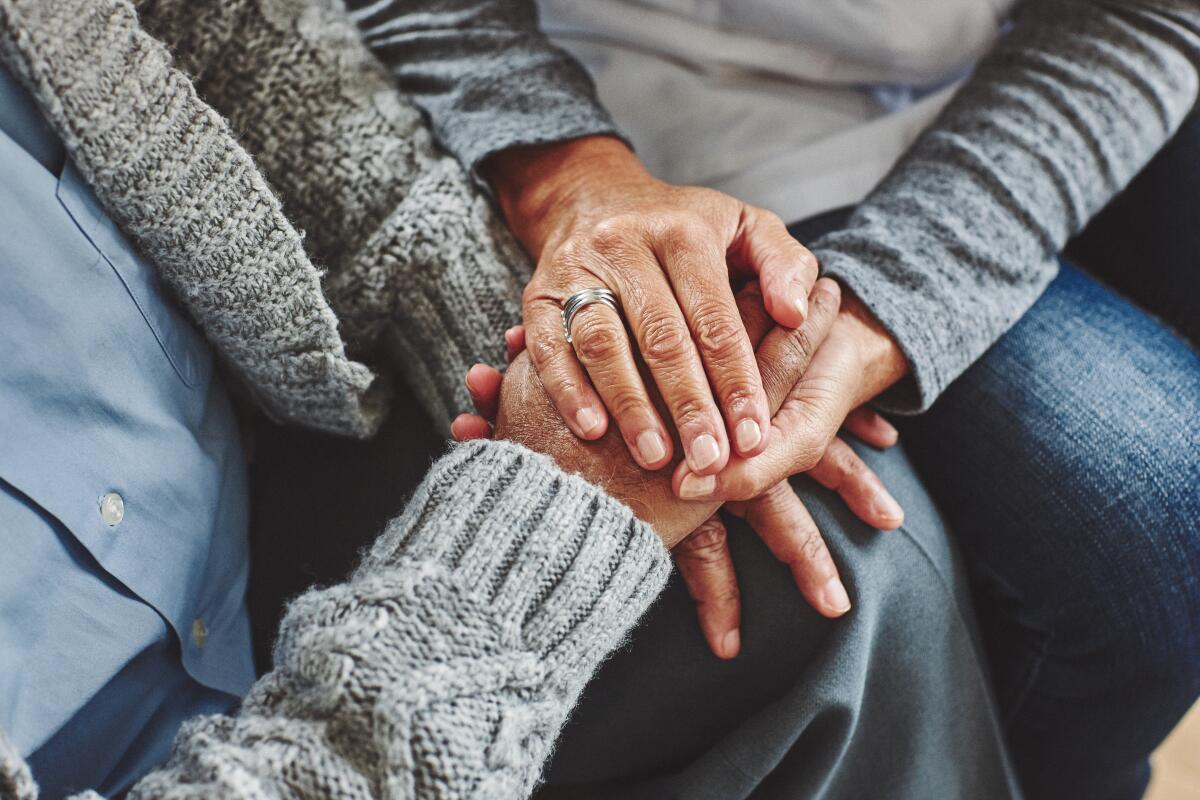Op-Ed: How the pandemic helped prepare me to cope with my father’s final days

- Share via
“Dying happens on its own schedule,” I told a concerned friend who called to check on me last May. Since I’d begun caring for my father dying at home, I couldn’t plan a shower let alone a phone call.
We talked a few minutes before I dropped the phone. My sister Shauna yelled for help lifting Dad, who’d gone from walking to needing a wheelchair in a week. We hoisted him onto the commode. “This might be it,” I said, sensing death nearer as he shook and strained.
He survived the night but died the next day.
Almost eight months later, hunkered down again with the Omicron surge, I’ve grown nostalgic for that terrible, yet mystical time of helping Dad die.
Dad never got COVID. He barely left home for more than a year. But the same lung cancer that stalked him for 16 years returned and finished him in a month, a cruel coda to our efforts to keep him safe throughout the pandemic.
The careening pace of pandemic time prepared me for the uncertainties of Dad’s last days as we assisted him with a kind of reverse birth, or death, midwifery. As we raced to keep up with his physical declines, we soon had to lift him, bathe him, guide his most private of parts — the organ that helped give us life — into a urinal. We were bombarded with agonizing decisions from the infinitesimal (“Can Dad swallow two drops of lemonade?”) to the staggering (“Should we have a do-not-resuscitate order?”).
I was powerless to hasten the end of a global virus or to slow cancer’s march through my Dad’s body. But I could surrender to the gifts of seclusion and quarantine time. Our last time together.
Dad preferred not to ask his oncologist about timelines. “Can’t do anything. I’m not scared, everybody has to die,” he said. We embraced the uncertainty that the pandemic had conditioned us to accept and stopped asking how long Dad would last. I bought my sister a one-way plane ticket from California to New York. “It’s bad,” I said. “But we’ll make it a party.” And we did.
Dad always loved when we stayed home with him. Do you have to go anywhere? No. How long are you staying? Forever. We joined my father’s world and never left. One of us always remained in the room, sleeping by his side.
Before he stopped eating, we fed him bits of favorite foods: Chilean hot dogs, Neapolitan ice cream, Dominican-style stewed chicken with sweet plantains. My father’s glowing television served as an electronic hearth, nightlight and constant companion. When not watching Cantinflas comedies, “Taxi Driver” or “Scarface,” the Music Choice 70s channel played day and night, providing a musical history of my father’s early life and the soundtrack for the last stories he would tell.
The music returned him — and us — to some of his best days, when he sailed the world for five years as a merchant marine before arriving in New York in 1975 as an undocumented Chilean immigrant. He was 32. Familiar songs provided an entree to whatever snatches of memories my father had energy to share.
One night he perked up at Barry White’s deep bass-baritone crooning “Can’t Get Enough of Your Love, Babe.” “It makes me think about when I first came to this country,” Dad said. He described a Chilean restaurant in Chelsea where he listened to White on the jukebox. “I was walking with you and your mother past there and all my friends said hi. You was in the stroller, little baby.”
Dad’s music served as a balm to my exhaustion, as days blurred and crashed into each other. Late at night I moved from researching pandemic survival tips to educating myself about how to care for the dying. I Googled “Can’t close eyelids, is death near?” and Yelped cremation services.
“Get Up and Boogie” played in heavy rotation with cruel irony when Dad could no longer walk to the kitchen. I pictured his younger self, when his strong body hustled to gain a foothold in this country, and he escaped the doldrums of back-breaking manual labor at Studio 54 and the Copa.
During my father’s last moments, Chic’s pulsing “Good Times” played as we observed his breath slow and stomach stop rising. The song’s message reflected my father’s lifelong philosophy about not wasting time, leaving worries behind and embracing the good times.
Now, sitting alone in his room, I listen to the music he loved with weariness and joy. Whenever a Bee Gees song plays, my father’s love insulates me from a world that feels more crumbly each day. I hear his trademark refrain: “You have to be happy. We have everything.”
Stacy Torres is an assistant professor of sociology in the Department of Social and Behavioral Sciences at UC San Francisco.
More to Read
A cure for the common opinion
Get thought-provoking perspectives with our weekly newsletter.
You may occasionally receive promotional content from the Los Angeles Times.










